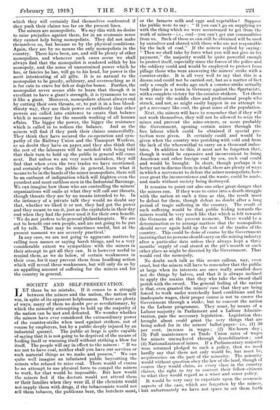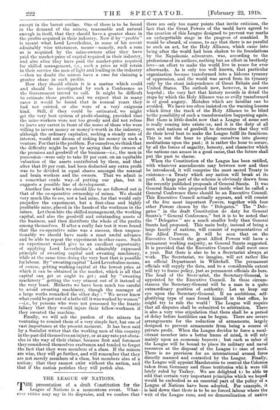SOCIETY AND SELF-PRESERVATION.
LETLET there be no mistake. If it comes to a struggle the miners and the nation, the nation will win, in spite of its apparent helplessness. There are plenty of ways, many of them no doubt per se revolutionary, by which the minority attempting to hold up the majority of the nation can be met and defeated. We wonder whether the miners have ever considered the extraordinary power of the counter-strike when used against strikers, not of course by employers, but by a public deeply injured by an industrial quarrel. The public at large is quite capable of saying that it is not going to be deprived of the means of feeding itself or warming itself without striking a blow for itself. The people will say in effect to the miners : " If we are not to have coal, neither shall you have our services or such material things as we make and possess." We can quite well imagine an infuriated public boycotting the miners who refused to raise coal. There would of course be no attempt to use physical force to compel the miners to work, for that would be impossible. But how would the miners feel if the doctors would not attend them or their families when they were ill, if the chemists would not supply them with drugs, if the tobacconists would not sell them tobacco, the publicans beer, the butchers meat, or the farmers milk and eggs and vegetables ? Suppose the public were to say : If you can't go on supplying us with the thing which we were accustomed to get from the work of miners—i.e., coal—you can't get our commodities from us. Such of these as can still be obtained will be used by ourselves and shared with those who are not responsible for the lack of coal." If the miners replied by saying : " Then we shall take by force what you will not give us for payment," the majority would be quite powerful enough to protect itself, especially since the forces of the police and the soldiery could and would be employed to protect from pillage those who were answering the miners' strike with a counter-strike. It is all very well to say that this is a dream and could not be carried out, but as a matter of tact only a couple of weeks ago such a counter-strike actually took place in a town in Germany against the Spartacists, with a complete victory for the counter-strikers. Yet there it was only the middle class and professional people who struck, and not, as might easily happen in an attempt to get a necessary like coal, the great mass of the population.
Next, the miners will have to remember that if they will not work themselves, they will not be allowed to seize the mines and prevent the mine-owners, or more probibly the Government, opening certain mines through the free labour which could be obtained if special pro- tection were given. It certainly could and would be Oven when the country was perishing with cold and from the lack of the wherewithal to carry on a thousand indus- tries. In addition to this, it must not be forgotten that, though it would be expensive and inconvenient to bring American and other foreign coal by sea, such coal could and would be brought. In short, though perhaps it is better not to discuss them in detail, there are plenty of ways in which a movement to defeat the miner monopolists, how- ever great the inconvenience and the waste, could be made. and made without society being destroyed.
It remains to point out also one other great danger that the miners run. If they were to enter into a death-struggle with the nation at such a time as this, the result must be defeat for them, though defeat no doubt after a long period of tragic suffering in the country. The result of such suffering would be that public feeling towards the miners would be very much like that which is felt towards the Germans at the present moment. There would he a determination so to arrange matters that the monopolists should never again hold up the rest of the trades of the country. This could be done of course by the Government insisting that no persons should carry on the mining industry after a particular date unless they always kept a three months' supply of coal stored at the pit's mouth or such other place as might be directed by the Government. That would end the monopoly.
No doubt such talk as this seems callous, nay, even cruel, but the miners will have to remember that the public at large when its interests are once really assailed does not do things by halves, and that it is always inclined to apply the maxim that they who take the sword shall perish with the sword. The general feeling of the nation is that, even granted the miners' case that they are being forced to work under wretchedly hard conditions and for inadequate wages, their proper course is not to coerce the Government through a strike, but to convert the nation to the Labour programme. They must, by means of a Labour majority in Parliament and a Labour Adminis- tration, pass the necessary legislation. Legislation thus brought about could grant the very things that are being asked for in the miners' ballot-paper—i.e., (1) 30 per cent. increase in wages ; (2) Six-hours day ; (3) Full maintenance at Trade Union rates of wages for miners unemj loyed through demobilization and (4) Nationalization of mines. If a Parliamentary majority were returned pledged to such a policy, then we need hardly say that there not only would be, but must be, acquiescence on the part of the minority. The minority would without question obey the law of the land, though of course they would claim, as every class in the country claims, the right to try to convert their fellow-citizens to what they would regard as a wiser and saner policy.
It would be very easy to expatiate upon the economic aspects of the case, which are forgotten by the miners, but unfortunately we have not space to set them forth except in the barest outline. One of these is to be found in the demand of the miners, reasonable and natural enough in itself, that they should have a greater share in the profits acquired in their industry. Now if by "profits" is meant what Lord Leverhulme, in some of his recent admirably wise utterances, means—namely, such a sum as is acquired by the mine-owners after they have paid the market-price of capital required in their industry, and also after they have paid the market-price required for skilled management, i.e., such a price as will retain in their service the men of light and leading in the industry —then no doubt the miners have a case for claiming a greater share in such profits.
How they should obtain it is a matter which could and should be investigated by such a Conference as the Government intend to call. It might be difficult to estimate those profits, and we expect that in many cases it would be found that in normal years they had not existed, or else were of a very exiguous kind. Still, if they could be estimated, we might get the very best system of profit-sharing, provided that the mine-workers were not too greedy and did not refuse to leave any carrot in front of the noses of those who were willing to invest money or money's-worth in the industry, although the ordinary capitalist, seeking a steady rate of interest, would not dream of risking his money in such a venture. For that is the problem. For ourselves,we think that the difficulty might be met by saying that the owners of the premises and goodwill of the business—i.e., the men in possession—were only to take 10 per cent. on an equitable valuation of the assets contributed by them, and that after that 10 per cent. had been deducted any extra profit was to be divided in equal shares amongst the manual and brain workers and the owners. That we admit is a somewhat crude way- of putting our plan, but it suggests a possible line of development.
Another line which we should like to see followed out is that of the co-operative ownership of mines. We should very much like to see, not a bad mine, for that would only prejudice the experiment, but a first-class and highly profitable mine, placed, in the hands of the workmen in the mines. Let them hire the skilled management, the working capital, and also the goodwill and outstanding assets of the business, and then distribute the whole of the profits among themselves. If after a really fair test it were found that the co-operative mine was a success, then unques- tionably we should have made a most useful advance and be able to repeat the experiment in other cases. Such an experiment would give us an excellent opportunity of applying Lord Leverhulme's admirably expressed principle of sweating capital and sweating machinery, while at the same time doing the very best that is possible for labour. By" sweating capital" Lord Leverhulme means, of course, getting working capital at the lowest price at which it can be obtained in the market, which is all that capital can get or ought to get ; and by "sweating machinery " getting the very utmost out of it instead of the very least. Hitherto we have been much too careful to avoid sweating machinery, though the manager of a large works remarked the other day : " We never knew what could be got out of a lathe till it was worked by women" —i.e., by persons who were not possessed by the frantic fallacy that they would injure their fellow-workmen if they sweated the machine.
Finally, we will ask the pardon of the miners for venturing to remind them of a very simple fact, but one of vast importance at the present moment. It has been said by a Socialist writer that the working men of this country in the past did themselves an injury, or at any rate put obsta- cles in the way of their claims, because first and foremost they considered themselves craftsmen and tended to forget the fact that th. were members of a class. If the miners are wise, they will go further, and will remember that they are not merely members of a class, but members also of a nation; that they cannot exist without the nation, and that if the nation perishes they will perish also.



































 Previous page
Previous page